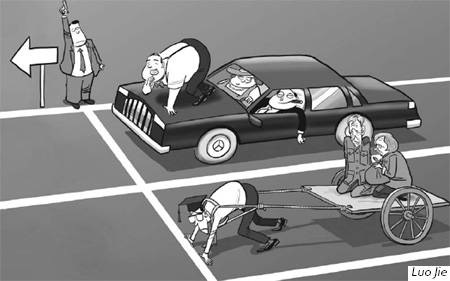Opinion
Inheritance seen as a wider social problem
By Sun Liping (China Daily)
Updated: 2009-11-24 08:04

When we talk about inheriting business and social mobility, we should keep the ongoing and unprecedented process of wealth allocation in mind. This process may consolidate the current wealth distribution pattern and social structure further. There are many signs to suggest that the channel for mobility is narrowing down as China's social structure undergoes a change.

The concept of "second affluent generation" emerged more than a decade ago. Now we are seeing the inheritance phenomenon in the "second poor generation" and the "second officials' generation". This trend reminds us that, given the widening divide between the rich and the poor, it is very important to expand the channels of social mobility, to especially allow talents from the grassroots to climb up the social and economic ladder.
Income disparity and its widening trend have become serious problems, which will not only escalate social contradictions, but also hinder the country's economic development. Therefore, it is imperative to curb the trend of income disparity through an effective social mechanism.
Social economy should be based on a sound social structure, which in China has at least three implications.
First, the size of the middle class should be increased. Academics both at home and abroad agree that the middle class is the backbone of social stability. It is an important force to boost domestic spending and the main group that represents modern culture. Thus, expanding the size of the middle-income group would be taking an important step toward reducing income disparity.
If the middle-income group does not comprise a high proportion of society, a polarizing social structure would become inevitable and the extreme income disparity could be left unresolved.
Second, the social ecology for the survival of the low-income group should be protected and strengthened. It is not enough to depend only on proper income redistribution and social security in order to reduce income disparity. To improve the living conditions of the poor and disadvantageous groups, more concrete and practical measures have to be taken, such as creating more opportunities for them to earn a living and improve their social status. The existing social ecology has to be improved especially because the poor have to be helped to earn more to eliminate economic disparity.
Third, channels of social mobility should not only be protected, but also expanded. Theoretically, as long as there are social stratification and economic and social differences among people, inheritance of wealth or poverty cannot be avoided. But the pace of inheritance and social mobility should be balanced so that the income gap does not widen further. So we need relatively unobstructed social mobility channels and opportunities because they can offset income polarization.
Statistics show that 80 percent of the country's total medical expenditure goes to serve a group of people that mainly comprises the 8.5 million Party and government officials. The per capita outpatient service charge increases by 13 percent a year in the country and per capita hospital expenses, by 11 percent. But surprisingly, China's medical care resources account for only 2 percent of the world total, and 44.8 percent of its urban and 79.1 percent of its rural residents have no medical insurance. Plus, a whopping 48.9 percent of the people cannot afford their medical expenses.
The "double-track retirement system" in government departments, public institutions and enterprises results in increasing wage gaps, too. Till the end of 2006, the average pension of retirees from various levels of governments and public institutions was twice that of those retiring from enterprises. This gap will widen further after the completion of allowance reform.
Another social security problem is how to guarantee that human resources are put to better use. The reality is that some powers still cannot be checked effectively and public expenditure is still beyond supervision and not transparent. Hence, it is imperative that we rebuild our social structure.
The author is a professor of sociology at Tsinghua University.













